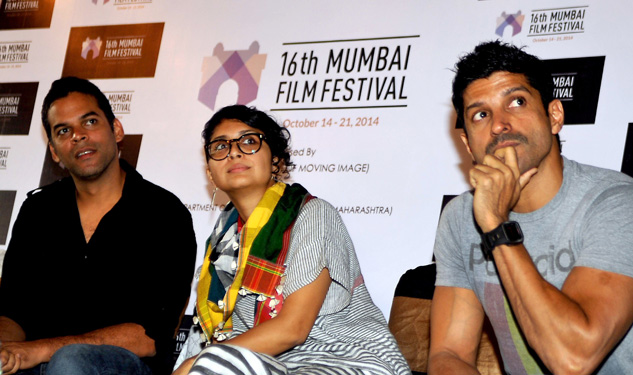
- Industry
Mumbai Film Festival 2014: The Festival That Almost Wasn’t
It was social media and crowd-funding that saved the 16th Mumbai Film Festival this year. When Reliance’s contract as the main sponsor ended last year and no corporation stepped up to fill the breach, the cancellation of the festival was a real possibility. Fans and critics took to Twitter, simultaneously blaming the festival executives for falling down on the job, blasting Bollywood for not stepping up to save this festival that was in its own backyard, and exhorting fans to contribute. Somehow it worked. Mumbai is a city of cinema lovers, and contributions small and large poured in, rescuing this event that filmmakers and fans embrace as their very own film university. The festival was off and running on October 14 with a lineup of over 185 films from 65 countries screened in various local cinemas. However, this is India and interesting hiccups are to be expected. The state elections that coincided with the first day caused the cancellation of the first two screenings of the day with traffic jams in every neighborhood. It was also a so-called ‘dry’ day – no alcohol sold or allowed to be consumed in public areas – something most foreign delegates found surprising. What surprised no one was the sweltering heat that enveloped the city in a blanket of humidity – screenings were routinely sold out, business was done and parties went late into the night. For the last seven years, a sidebar called Rendezvous with French Cinema has been a staple of the festival, though this year was special with Catherine Deneuve receiving the Lifetime Achievement Award at a glittering opening ceremony attended by many Bollywood stars, followed by a screening of Serena, the Susanne Bier film starring Jennifer Lawrence and Bradley Cooper. Films included in Rendezvous included a retrospective of some of Deneuve’s classics like La Vie de Chateau, Les Bien-Aimes, Le Dernier Metro and Les Parapluies de Cherbourg, as well as her newest film Dans La Cour in which she plays a woman grappling with mental illness, which she introduced. Others in this section included Michael Haznavicius’ latest The Search, Mathieu Amalric’s La Chambre Bleue, and Alain Resnais’ Life of Riley. A highlight of the festival was the Music Composer’s Lab with moderated panels leading discussions on topics like the business and creative sides of film music, recording with an orchestra, sound engineering, and copyrights and publishing, all sponsored by Bohemia Junction and Abbey Road Studios. A Celebration of Arab Cinema was well received with films like Hany Abu-Assad’s Omar and Egyptian films Fool’s Alley and The Collar and the Bracelet, as were various Master Classes (one with Deneuve), and a Films Remake Market organized by Unifrance Films. The big winners awarded prizes on Closing Night were Court directed by Chaitanya Tamhane which won Best Film in the International Competition as well as Best Director and a special jury mention for its ensemble cast (it had already won two prizes at the Venice film festival), Gueros from Mexico which won the Grand Jury Prize, Best Actor was Martin Loizillon for his role in the French film Fever, and Best Actress was awarded to Liron Ben Shlush in the Israeli film Next to Her. Bollywood superstar Aamir Khan declared the festival closed with reminiscences of the first one and encouraged the audience to keep the event going. “The problems it faced this year is a reminder of what this festival means to us and how much Mumbai needs to sustain it.” The Closing Night film was Brad Pitt’s Fury. On behalf of the HFPA, a reception was hosted by Noel de Souza and Meher Tatna for young filmmakers and producers, in the presence of jurors, press and festival executives where a plaque was presented to the Festival Director and a brief explanation of the history of the Golden Globes and the rules for submission of films for Globes consideration was given. A lively question and answer session ensued, no doubt enhanced by the sudden liquor license produced after the ‘dry’ day (election results day) ended at 7.30 pm with no notice. Only in India.

